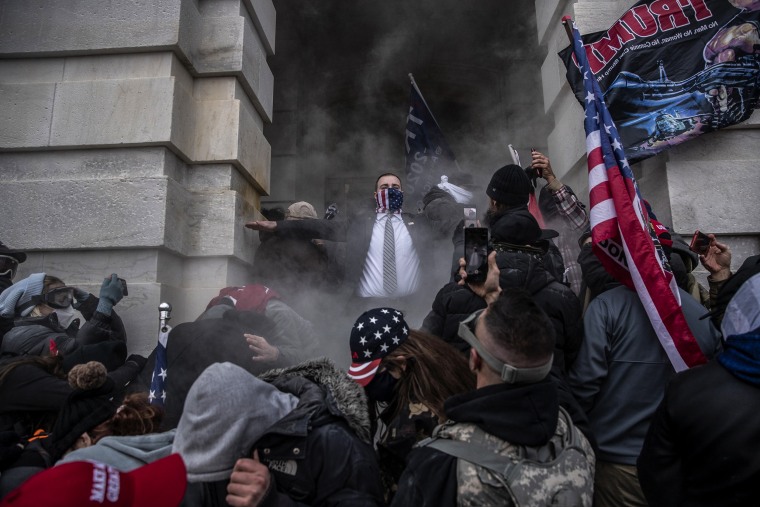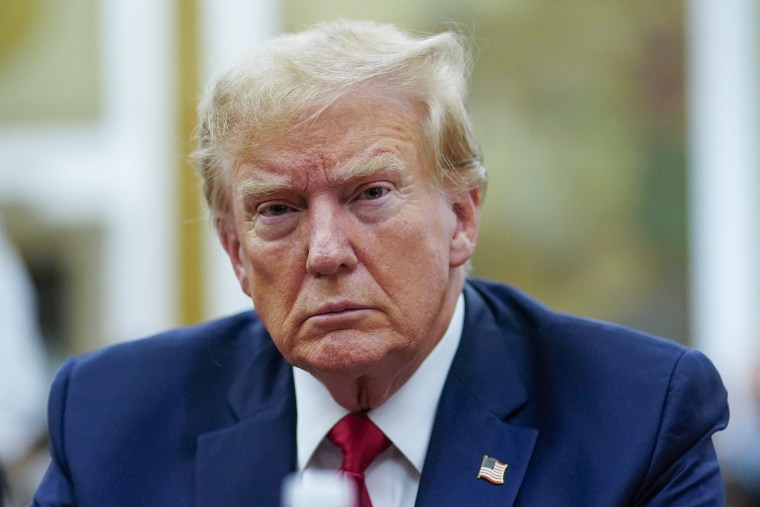WASHINGTON — The Supreme Court on Wednesday agreed to hear an appeal brought by a man charged with offenses relating to the Jan. 6, 2021, assault on the U.S. Capitol in a case that could have a major impact on the criminal prosecution of former President Donald Trump.
The justices will hear a case brought by defendant Joseph Fischer, who is seeking to dismiss a charge accusing him of obstructing an official proceeding, namely the certification by Congress of President Joe Biden’s election victory, which was disrupted by a mob of Trump supporters.
Two other Jan. 6 defendants, Edward Lang and Garret Miller, brought similar appeals, the outcome of which will be dictated by the Supreme Court's ruling in Fischer's case.
Fritz Ulrich, a federal public defender representing Fischer, said he was pleased that the court will clarify the scope of the law in question but had no further comment.
Trump has been charged with the same offense as well as others in his federal election interference case. The court's decision to take up the issue, as well as the timing of its ultimate ruling, could therefore affect his case.
It will take months for the justices to hear oral arguments and issue a ruling sometime during the court’s current nine-month term, which ends in June.
Trump’s lawyers could use the Supreme Court’s involvement as one opportunity to delay his election interference trial, which is scheduled to start in March.
Trump is the front-runner in the polls for the Republican presidential nomination, and any delay in his criminal trial in Washington would be to his benefit.
If Trump were to win the election in November, he would then be in a position to have the charges dismissed. If the case proceeds as scheduled in March and Trump were to be convicted, he could be sentenced before the election.
The election interference case is one of four criminal prosecutions Trump is fighting. Two were brought by special counsel Jack Smith, while the others were brought in New York and Georgia.
In the Supreme Court case, the only provision of the federal criminal code at issue is 18 U.S.C. 1512(c)(2), which criminalizes any effort to “corruptly” obstruct, influence or impede any official proceeding. Conviction can result in a prison sentence of up to 20 years.
The provision was enacted in 2002 as part of the Sarbanes-Oxley Act, a bill passed in the aftermath of the Enron accounting scandal. As such, defendants say it was never intended to apply to an incident such as Jan. 6.
Trump's lawyers have already made that argument in asking for his indictment to be dismissed.
The application of the provision in Trump’s case could also raise issues separate from those in the Supreme Court appeals, in part because Trump himself did not participate in the Capitol attack.

In lower courts, defendants have said the law has been applied too broadly and questioned whether the word “corruptly” can be applied to their cases, basing the argument on the theory that the statute refers only to tampering with evidence and not, for example, to the assault of a police officer.
U.S. District Judge Carl Nichols, who is overseeing the criminal cases of the three Jan. 6 defendants, initially dismissed the charges, one of several each of the defendants faces.
But in an April ruling, the U.S. Court of Appeals for the District of Columbia Circuit ruled for the government in a 2-1 vote. The three judges all differed in their reasoning.
Fischer is a former police officer who the government says had a physical encounter with another officer and urged rioters to “charge” and “hold the line.” Fischer’s lawyers said he entered the Capitol only after Congress had recessed and was inside the building for just four minutes.
Fischer said he wanted to go “to war” and take "democratic [C]ongress to the gallows” if Trump did not get into office for a second term, government prosecutors said. “Can’t vote if they can’t breathe ... lol,” he allegedly texted.
The Justice Department said in court papers that even if the Supreme Court is interested in taking up the Jan. 6 appeals, it is too early to intervene because none of the defendants have yet gone to trial on the obstruction charge.
“The government is prepared to proceed to trial and to prove beyond a reasonable doubt that petitioners corruptly obstructed, influenced, or impeded the joint session on January 6, or attempted to do so,” Solicitor General Elizabeth Prelogar wrote. She also said that a subsequent appeals court ruling in a different Jan. 6 case, which prosecutors won, has clarified the meaning of “corruptly.”
The Supreme Court, which has a 6-3 conservative majority, has often chafed at the Justice Department’s broad application of criminal statutes.
The court in 2015 threw out a Florida fisherman’s conviction under another provision of the Sarbanes-Oxley law. His disposal of red grouper fish while under investigation did not fit within the definition of the law’s “anti-shredding” provision intended to prevent destruction of evidence, the court held.


